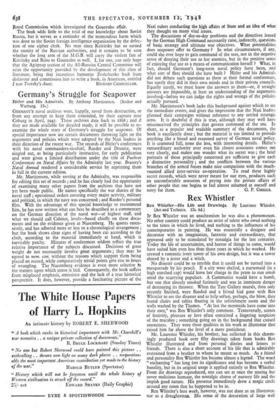Germany's Struggle for Seapower
GERMANY'S naval archives were, happily, saved from destruction, or from any attempt to keep them concealed, by their capture near Coburg in April, 1945. These archives date back to 1868 ; and if they are made available for detailed study, it, will be possible to re- examine the whole story of Germany's struggle for seapower. Of special importance now are certain documents throwing light on the arguments and policies which were adopted by the Nazi leaders in their direction of the recent war. The records of Hitler's conferences with his naval commanders-in-chief, Raeder and Doenitz, were singled out, as being . particularly instructive, for early publication and were given a limited distribution under the title of Fuehrer Conferences on Naval Affairs by the Admiralty last year. Brassey's Naval Annual rendered a considerable service by reprinting them in full in the current edition.
Mr. Martienssen, while serving at the Admiralty, was responsible for editing this set of records ; and he has clearly had the opportunity of examining many other papers from the archives that have not yet been made public. He names specifically the war diaries of the naval staff ; operational orders covering every major activity, military and political, in which the navy was concerned ; and Raeder's personal files. With the advantage of this special knowledge to recommend bim, he has now written what can best be described as a commentary on the German direction of the naval war—af highest staff, and what we should call Cabinet, levels—based chiefly on these docu- ments and on the evidence given at Nuremberg. He quotes exten- sively, and has adhered more or less to a chronological arrangement ; but the book shows clear signs of having been cut according to the cloth, according to the material immediately at hand, which is inevitably patchy. Minutes of conferences seldom reflect the true relative importance of the subjects discussed. Decisions of great weight do not necessarily involve great arguments ; they may be agreed to nem. con. without the reasons which support them being placed on record, while comparatively trivial points give rise to hours of wrangling. The Nuremberg evidence is even more selective M the matters upon which stress is laid. Consequently, the book suffers from misplaced emphasis, omissions and'the lack of a true historical perspective. It does, however, provide a fascinating picture of the
Nazi rulers conducting the high affairs of State and an idea of what they thought on many vital issues.
The discussions of day-to-day problems and the directives issued by the German High Command necessarily raise, indirectly, questions of basic strategy and ultimate war objectives. What potentialities does seapower offer to Germany ? In what circumstances, if any, could she ever hope to gain command of the seas, not in the negative
sense of denying their use to her enemies, but in the positive sense of enjoying that use as a means of communication herself ? What, in fact, should Germany's long-term naval policy have been, and what sort of fleet should she have built ? Hitler and his Admirals did not debate such questions as these at their formal conferences, but surely they did in their own minds and in their private councils. Equally surely, we must know the answers to them—or, if straight answers are impossible, at least an understanding of the arguments involved—before we can judge the rights and Wrongs of the policies actually pursued.
Mr. Martienssen's book lacks this background against which to see the immediate events, and gives the impression that the Nazi leaders planned their campaigns without reference to any settled strategic aims. It is doubtful if this is true, although they may well have misconceived the principles that govern command of the sea. In short, as a popular and readable summary of the documents, the book is excellently done ; but the material is too limited to provide anything like a broad and reasoned survey of German naval policy. It is crammed full, none the less, with interesting details. Hitler's extraordinary authority over even his closest associates comes out very clearly, and makes one wonder what its secret was ; the brief portraits of those principally concerned are sufficient to give each a distinctive personality ; and the conflicts between the various branches of the armed forces make nice comparison with the much- vaunted allied inter-service co-operation. To read these highly secret records, which were never meant for our eyes, produces such an uncomfortable sensation of prying into the private affairs of other people that one begins to feel almost ashamed at oneself and


































 Previous page
Previous page